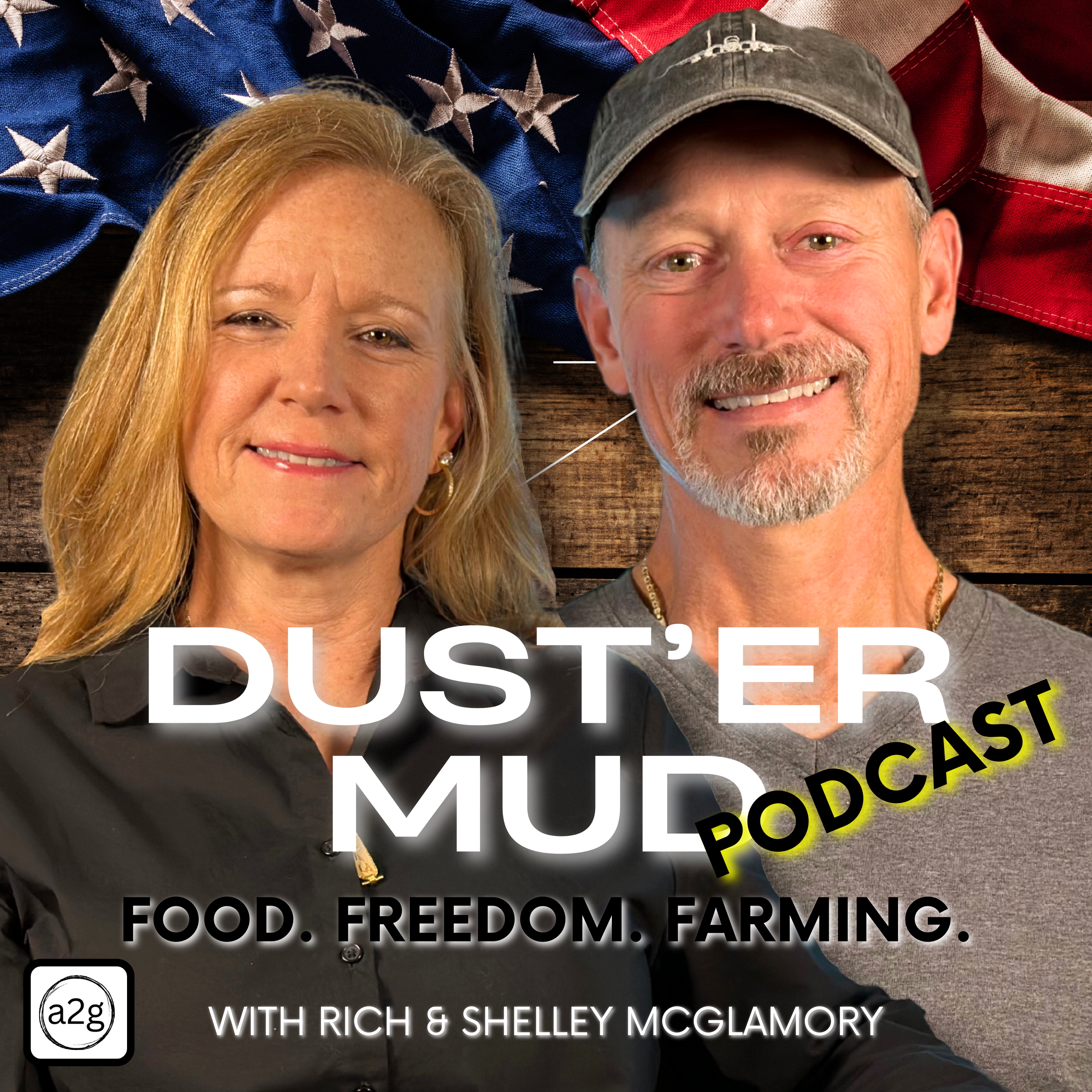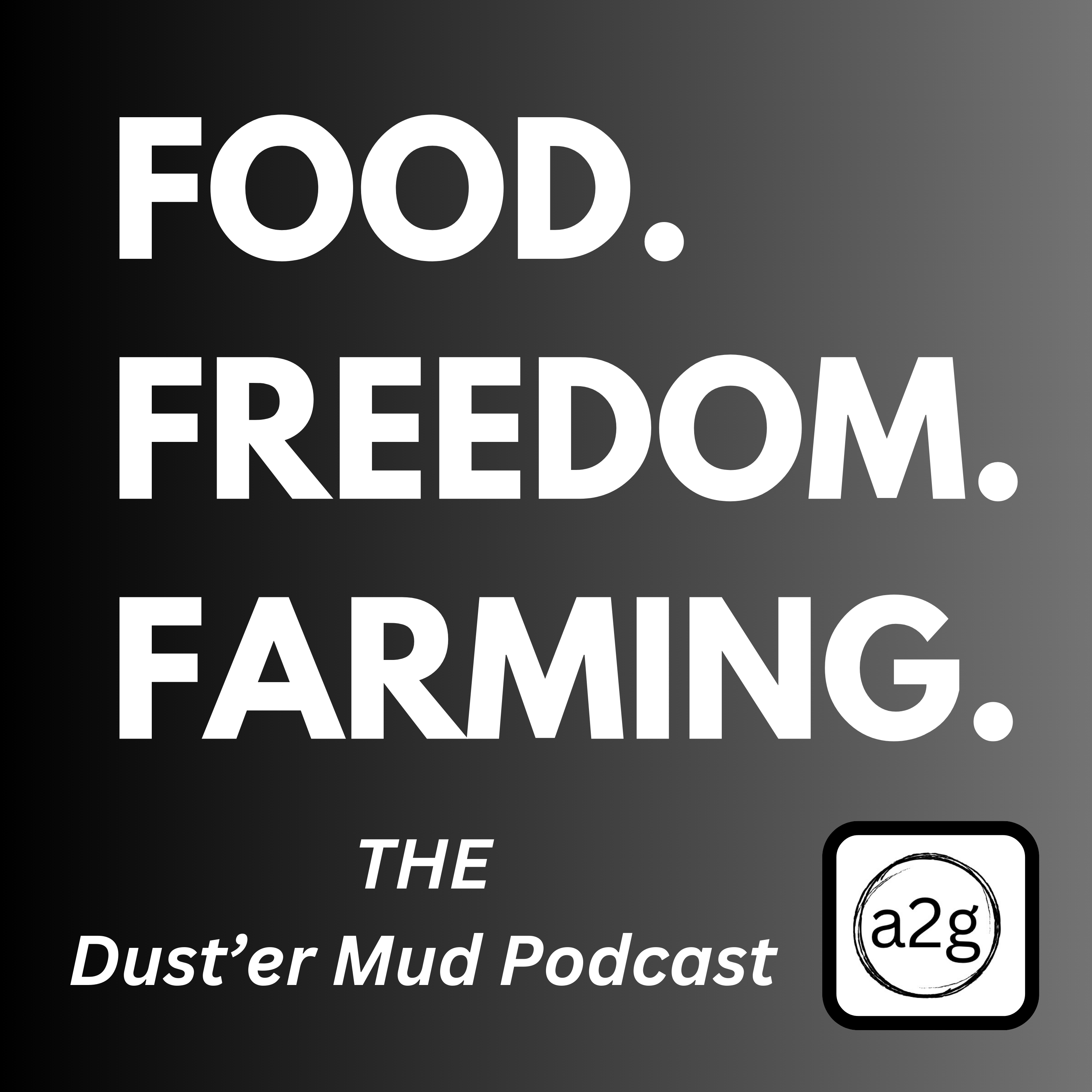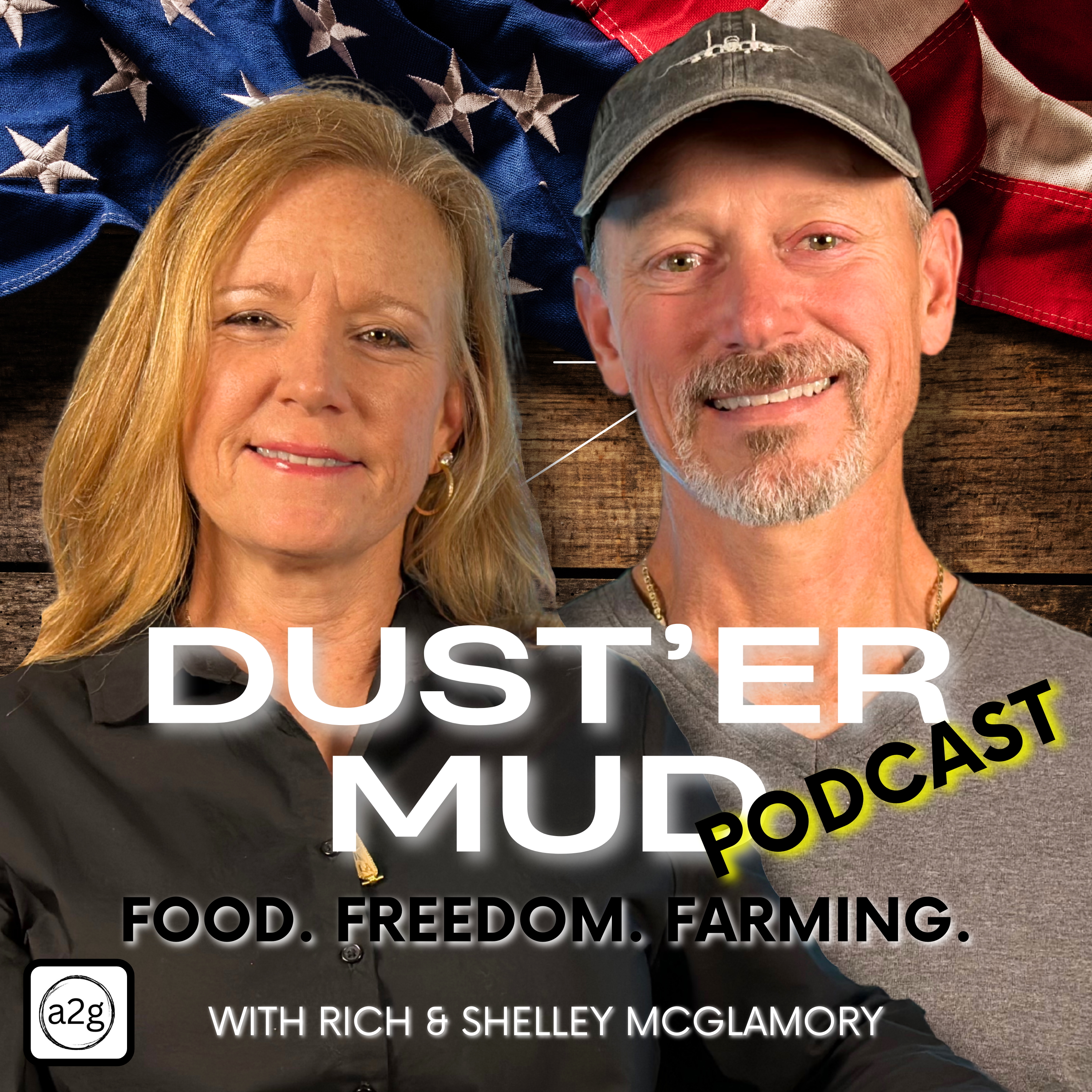Episode Transcript
[00:00:00] Speaker A: The last time I checked, food is essential for any civilization to exist. And unfortunately, in our world today, the very act of growing food has come under attack from globalists, and it has infiltrated the minds of many young people.
[00:00:18] Speaker B: So our friend shared with us a clip of a young gentleman, and he was explaining that farming needs to stop. It's the single biggest driver of climate change.
[00:00:28] Speaker A: Farming needs to stop. That's the single biggest driver of climate change.
[00:00:32] Speaker B: That really got us to thinking. We really need to talk about what is a farm and what happens if there aren't farmers, or what happens if what he's recommending actually comes to pass.
[00:00:45] Speaker A: Yeah, seriously, a farm and no farms. I don't even understand what they're really getting at. It just kind of blew my mind. And as we were looking into it, it, it, it really got us to thinking, like, really, let's nail down. Does he, what is he really trying to say? You know, I don't, I don't. I'm hoping that he's not trying to say what he's actually saying.
[00:01:11] Speaker B: Yeah, I don't know. I think that we're in a place in civilization, as you mentioned, where people think that food comes from the grocery store. Like, literally, it's. Its existence begins at the grocery store and it is then consumed.
[00:01:31] Speaker A: So it's manufactured like a t shirt.
[00:01:34] Speaker B: I don't, maybe, I don't even think they think that far ahead or behind. Like, I think in their mind, it. Food comes from the store, period. Like, it, it's at the store. Like, it doesn't manifest, it doesn't come there on a truck. It wasn't grown someplace else. Like, it's just from the store.
[00:01:54] Speaker A: Literally 100% out of touch with any.
[00:01:56] Speaker B: Of it, I believe that's the case.
[00:01:58] Speaker A: So that got us to thinking, what is a farm and a place to look is at the United States Department of Agriculture. How do they define a farm?
[00:02:07] Speaker B: USDA defines a farm as any place that has the potential of producing up to $1,000 annually of an agricultural type product.
[00:02:18] Speaker A: Well, that's a pretty minimal guidelines. I mean, that's requirements.
[00:02:25] Speaker B: Yeah.
[00:02:25] Speaker A: That's $1,000 annually to. And you're a farm.
[00:02:30] Speaker B: Yes.
[00:02:31] Speaker A: That's cool.
[00:02:33] Speaker B: The potential.
You don't actually have to make a $1,000.
[00:02:37] Speaker A: You don't have to succeed.
[00:02:38] Speaker B: That's correct. You can fail miserably and make $0 or lose money.
[00:02:42] Speaker A: Okay.
[00:02:43] Speaker B: But if you have the potential of earning $1,000 in a year or, sorry. Producing $1,000 worth of agricultural product, you are a farm.
[00:02:53] Speaker A: So the USDA describes it in a very, in a very small way that qualifies as a farm. But that's not generally what most of us see as a farm. The majority of us see very large combines, very big tractors and equipment, plowing and planting large acres of products.
That's what I. Maybe we typically think of in the farming world, right?
[00:03:21] Speaker B: No, I think so.
[00:03:22] Speaker A: That's a, it's a huge contrast to what we think is a farm and what the USDA says is a farm.
[00:03:28] Speaker B: That's correct.
[00:03:29] Speaker A: Okay.
[00:03:30] Speaker B: So I looked at that and said, hey, what would it take? We have a friend, and she has recently started a microgreens business. And she has her microgreens business set up in a twelve by 14 shed in the backyard. And I was wondering, is she a farm? Like, we have 160 acres? And we were wondering in a previous podcast, are we a farm?
[00:03:54] Speaker A: Yeah.
[00:03:55] Speaker B: Right.
[00:03:55] Speaker A: So are we farming yet?
[00:03:57] Speaker B: Right. And so I got to looking at, so what? Look at microgreens. So the average price for microgreens is about anywhere from $25 to $40 a pound. A typical ten by 20 tray yields eight to 12oz, so roughly a half to three quarters of a pound. So if you can sell at $30 per pound, each tray could generate anywhere from 15 to 22 ish dollars per tray. So to make $1,000, you'd need to grow 45 to 67. So just say around 50 trays of.
[00:04:34] Speaker A: Microgreens, like one time, once.
And she's currently growing 20 to 25 trays, like a week.
[00:04:44] Speaker B: So in a two week time period, she is now considered, according to the USDA, in her twelve by 14 shed growing microgreens. She is a farmer. She has a farm.
[00:04:59] Speaker A: Awesome.
[00:05:00] Speaker B: Absolutely. Oh, and by the way, Kathy, you can file a schedule f you as a farmer.
[00:05:07] Speaker A: Oh, yeah, absolutely.
[00:05:08] Speaker B: You don't have to have an llc, you don't have to have any of those things. I know you do, but you don't have to have any of those things and file a schedule f. You're a farmer.
[00:05:16] Speaker A: Yep. And there's a lot of huge tax incentives filing a schedule f. Yeah.
[00:05:22] Speaker B: So it doesn't take a whole lot to be a farmer. And if you look at it, 80% of the world's food production.
So while we think of the big monocrops like you were describing, when we think of farms, 80% of the world's food is produced on small farms, most of them twelve acres or less.
[00:05:45] Speaker A: Wow.
[00:05:46] Speaker B: Now, a lot of that food is being produced in Asia and Africa.
And the small farms are where that happens. The big commodity farms are what we're thinking of, and those are typically in the more industrialized nations like the United States. And I think more along the lines of what is in the mind of these ridiculous kids, as I would say, protesting farming.
[00:06:12] Speaker A: But they didn't get this idea from anywhere. They've gotten this idea coming from the top down. And organizations like the World Economic Forum along tied into their agenda 2030 and their anti agriculture, anti farming sentiment that they're passing down to these young minds who are very impressionable, and they are teaching them in this message of how bad farming is. But what they do not realize is, what are the ramifications of, of farming needs to stop.
[00:06:54] Speaker B: Right.
[00:06:55] Speaker A: Let's talk.
The ramifications are far more grave, I think, than they could ever possibly imagine.
[00:07:04] Speaker B: Right. So the agenda 2030, the actual verbiage, doesn't sound terrible. It is more regenerative farming. Can we do things with by using less land, like, as is typical with these types of documents, it doesn't sound terrible, but the talking points coming out of it lead to things like, we have to stop farming.
[00:07:28] Speaker A: Farming needs to stop. That's the single biggest driver of climate change.
Before we go any further, if you are enjoying this or finding any value in this podcast, would you go ahead and boop that like button? And if you haven't already, hit the subscribe button? And that way, whenever we put out new podcasts and videos on the farm, you will get them in your suggested or your browse feed.
[00:07:55] Speaker B: So, back to the kid protesting.
Look, the mindset, if we take that to its logical conclusion, farming needs to stop.
Like, if that actually happens, civilization as we know it ends.
In a number of days, people start being hungry. In a number of weeks, people start starving.
And you mentioned historically.
[00:08:28] Speaker A: Yeah, so historically, they did an experiment. Sherman Mao did an experiment, and through his policies, attacked farms, farmers and millions of people died. Yep, millions. And that was just in one country.
[00:08:48] Speaker B: Right?
[00:08:49] Speaker A: One experiment. If they want to try this globally.
[00:08:53] Speaker B: The Soviets did the same thing. Right?
[00:08:55] Speaker A: Right.
[00:08:55] Speaker B: They collectivized farming. They went and took away the family farms and collectivized it, but they didn't know how to grow the food. And so again, millions of people died.
[00:09:06] Speaker A: We saw it just in 2019 or 2020 with COVID when that we couldn't produce enough or we weren't producing as much. We didn't have as much meat on the shelves, we didn't have as much produce. The food wasn't getting there to the grocery stores where people think it manifests. They weren't. It wasn't getting to the stores, and the shelves were going bare. And so that was a small, small glimpse as to what can happen if there's not. If the food isn't getting to the people.
Majority of people live in cities. Okay, so back to farming.
[00:09:47] Speaker B: Well, everybody can be a farmer. Let's just go there.
[00:09:50] Speaker A: Okay.
Right. Yeah. Because if you can do it in your shed and grow some microgreens, what else? What are some other options?
[00:09:59] Speaker B: If you could. We just talked about 50 trays is what it would take. That's one tray a week. You could grow that in a windowsill.
[00:10:08] Speaker A: Sure. Hey, we. A lot of us in this community are growing gardens, and we have tomatoes, and maybe we have too many tomatoes and us. And if you have, like, say, 30 tomato plants, you're a farmer.
[00:10:25] Speaker B: 25 to 30 tomato plants, you're a farmer. You're a farmer.
[00:10:28] Speaker A: And I think what that is driving home as anyone can farm, is not really the concept of the victory gardens, but everyone can farm if we've got a little bit of space. And so if we have to go locally.
[00:10:49] Speaker B: Yeah.
[00:10:49] Speaker A: And grow some food.
[00:10:50] Speaker B: Yeah. Again, most of the food around the world is produced locally, so. Although in the United States, our food is produced in the grocery store, I guess.
Patrick, that's not. That's not what happens around the world. No, around the world, food is produced locally, and we can get back to that. We can get back to food being produced locally. And my point in saying everyone can be a farmer. Hey, join us.
[00:11:23] Speaker A: Yeah.
[00:11:23] Speaker B: Be a farmer. Like, you can call yourself a farmer. Like, legally, if you grow a tray of microgreens a week, you now have the potential of earning $1,000 off of your agricultural products. You are a farmer.
Like, join us. Join the movement.
[00:11:44] Speaker A: Right?
[00:11:44] Speaker B: Become a farmer.
[00:11:45] Speaker A: Awesome. Yeah, that's awesome. That is.
[00:11:48] Speaker B: I can think of no better way to speak out against the lunacy of farming must stop than for all of us to become farmers.
[00:11:58] Speaker A: I'm a farmer, too.
[00:11:59] Speaker B: Yeah. I'm a farmer.
[00:12:00] Speaker A: Right? We'll all be farmers.
[00:12:02] Speaker B: I have 30 tomato plants. I'm a farmer.
[00:12:04] Speaker A: Right.
[00:12:04] Speaker B: Or I have a mix of 15 tomato plants and ten lettuce plants. I mean, whatever it is. Right.
[00:12:09] Speaker A: Yeah.
[00:12:09] Speaker B: Like, I'm a farmer. And file a schedule f because you.
[00:12:14] Speaker A: Have the microgreens on your balcony. Yeah, I'm a farmer. Yeah. That's great. That's really good. So while maybe farming practices might need to change on some scales and some levels, I get that, but we cannot. We cannot buy into the sentiment of farming needs to stop, because if farming stops, so does civilization. And that has got to be one of the most dangerous phrases that I have ever heard on the Internet.
[00:12:49] Speaker B: Yeah. The end result of that, historically speaking, the end result of attacks on farmers is millions of people starving to death.
[00:12:58] Speaker A: So join us and become a farmer. And until next time, bye, y'all.
[00:13:03] Speaker B: Bye, y'all.


